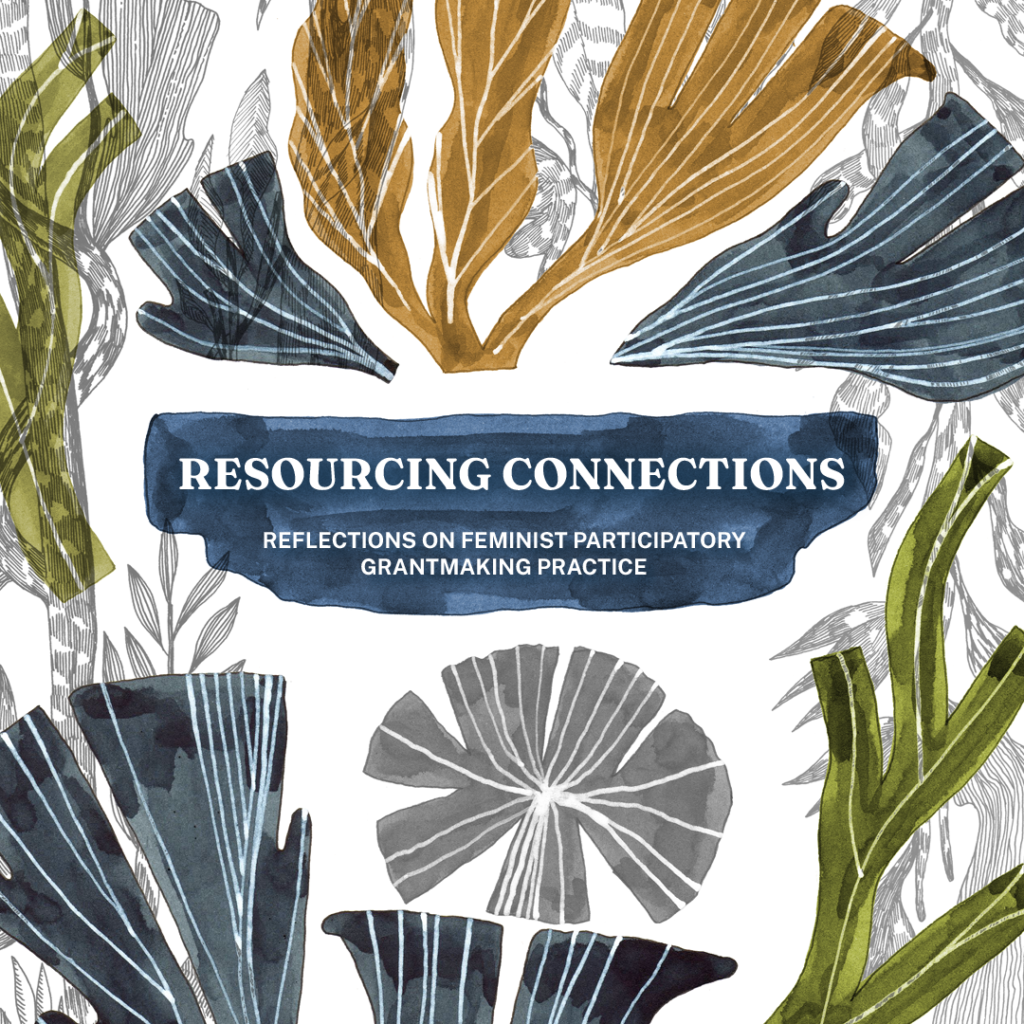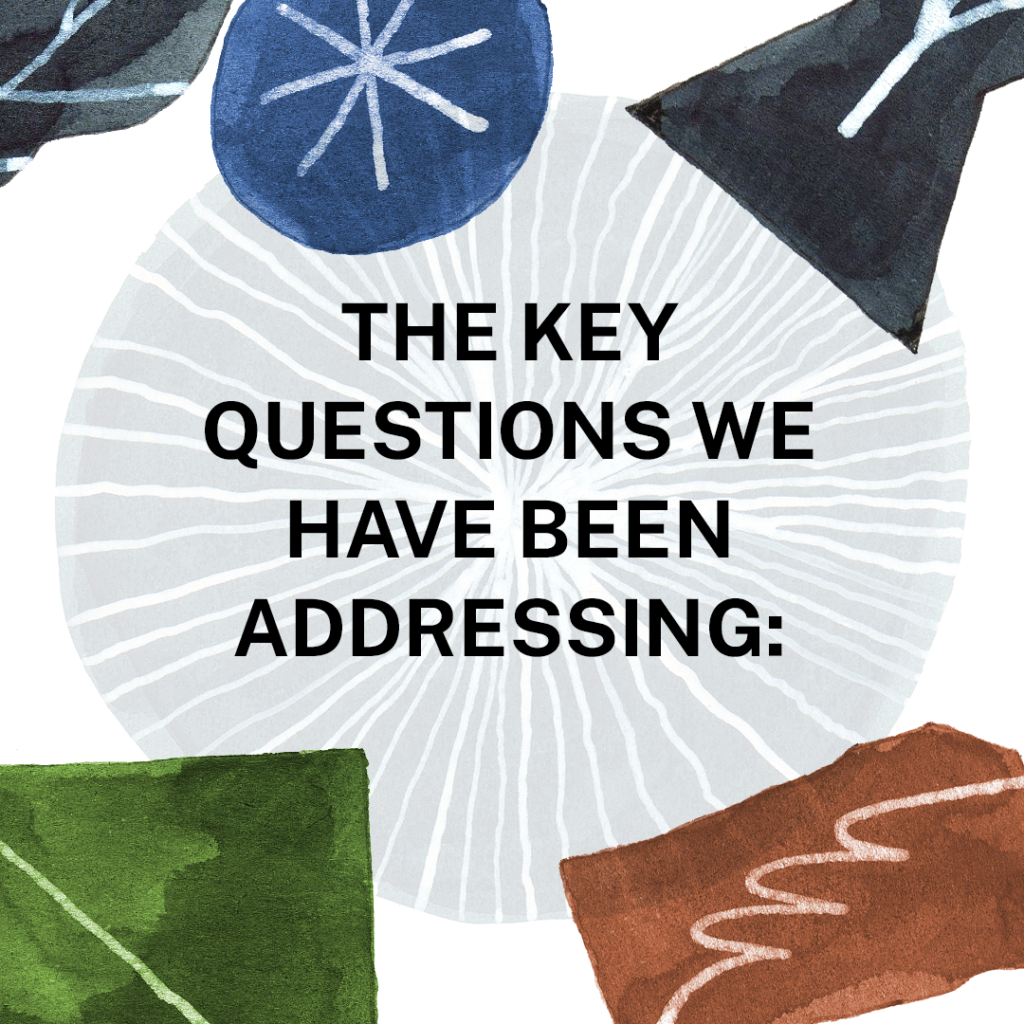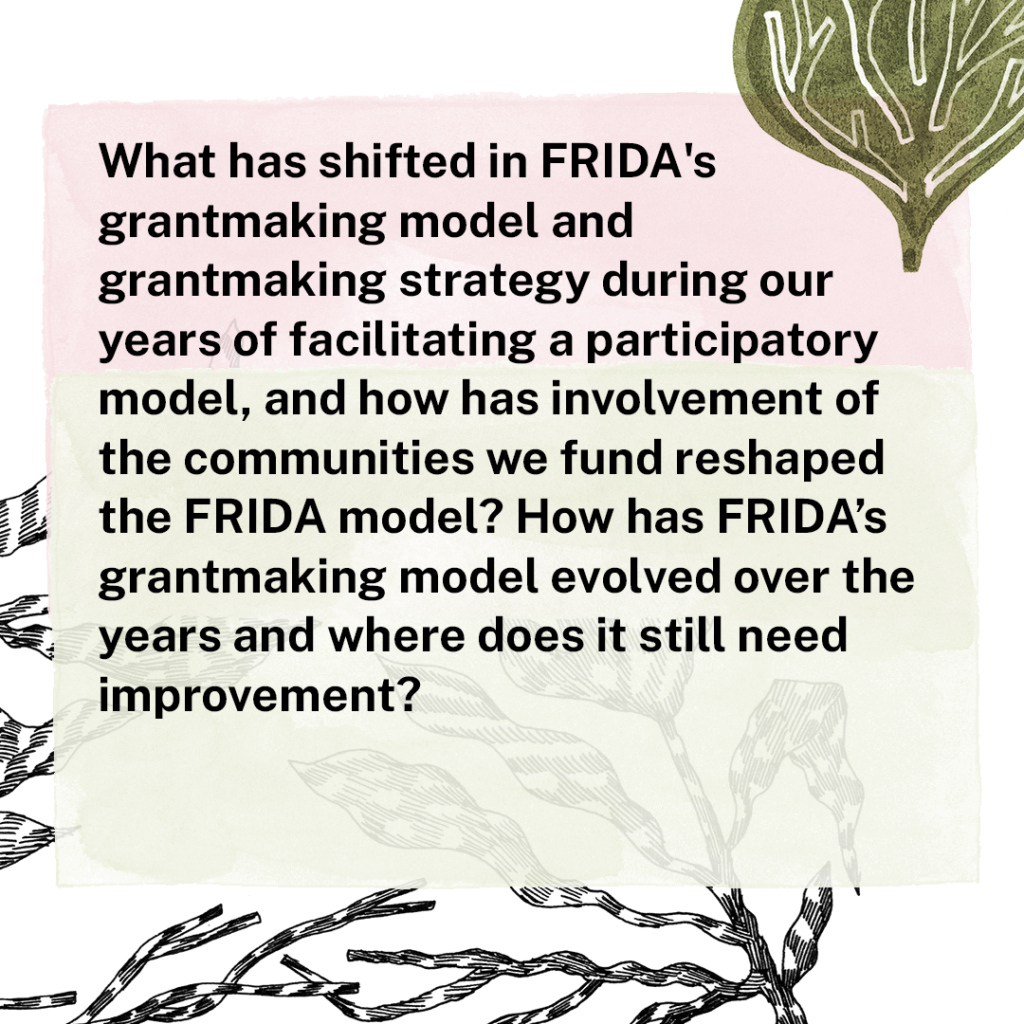FRIDA exists today because of the collective power and vision of feminist activists across generations and cultures who understood the urgent need for a fund that centers the experience, expertise, and needs of young feminist organizers. This recognition of young feminist organizers’ need for funding that holistically supports their sustainability and well-being birthed the creation of our participatory grantmaking model that would mirror the feminist values of solidarity, accountability, exchange, and caring connections.
Over the last few years, we have delved deep into a process of reflection and learning about this grantmaking model, with full openness to the fact that the process we have developed and nurtured with love, might require a deep transformation. As part of our ongoing learning process, we uplift what has brought joy in this process, and let go of what needs to be left behind.
After undergoing this extensive reflection process, we share with you “Resourcing Connections: Reflections on Feminist Participatory Grantmaking Practice”. This report hopes to reflect all the pieces of this interrogative research, and the vastness of young feminist knowledge and experience, with findings, derived directly from the feedback of these communities. We share the fruit of this research as part of our commitment to feminist accountability and with the hope to not only shift the power dynamics surrounding funding decisions but also to decentralize narratives about who holds knowledge about and solutions for community participatory practices.

Reflections on Feminist Participatory Grantmaking Practice.
CLICK HERE TO READ THE FULL REPORT
WHAT ARE WE EXPLORING IN THIS REPORT?
Even after a decade of participatory grantmaking practice, we approach every grantmaking cycle with curiosity and acceptance of the need for processes to evolve with the needs of our community. This process engaged applicants, grantee partners, and FRIDA advisors on what segments of FRIDA’s model brought joy and excitement, and what they found challenging and think should be assessed or changed in the future. This research presents both quantitative and qualitative findings through a feminist intersectional lens and with an understanding of how interlocking systems of oppression influence our data. This is a report back to young feminist communities about what we have learned in our grantmaking from 2015-2021, and how FRIDA will move forward with this collective knowledge. This research is dedicated to all young feminist collectives that have ever applied to FRIDA, supported their peers with their time and presence, and trusted us to facilitate this process.

HERE ARE SOME OF THE KEY QUESTIONS WE HAVE BEEN ADDRESSING THROUGH THIS RESEARCH:
- What is the impact of funding practices where communities decide what is important to fund in their organizing context? What are the challenges and complexities of participation and connection, and how can we address them?
- Can participatory grantmaking provide a space for young feminist collectives to connect, practice solidarity and build movements? How does participatory grantmaking process embrace an intersectional lens to create conditions for authentic knowledge exchange and connection?
- What are young feminist solutions to transforming power structures in philanthropy and distribution of resources? What do young feminists envision a feminist funding mechanism would look like? What tools are young feminists using to address and advocate for change in power structures? How are young feminists collaborating with other groups and how do they involve communities in their work?
- What are the technical, political and ethical aspects of FRIDA’s participatory model and its impact? What are the limitations of this model? What solutions exist for improvement? What are the challenges of implementing a participatory model of grantmaking, and what structure do we need to put in place to practice feminist values while facilitating a participatory process?

KEY LEARNINGS
What we have learned confirms that FRIDA’s grantmaking model aligns our decision-making with feminist values and principles and fulfils its main purpose–building movement connection, power and mutual accountability:
- Feminist participatory decision-making models are already a feminist movement practice and the vision movements have for a feminist funder.
- Participatory grantmaking deepens our understanding of diverse perspectives and realities and how to most effectively support young feminist organizers across political, social and economic contexts.
- Movement-building in an online space is possible. Facilitating meaningful connections and a
ligned visions allows us to uplift and be present for each other across geographies. - After connecting with the impact of their participation, groups are more willing to participate in another of FRIDA’s internal participatory processes and to apply participatory strategies in their own processes.
- Recognizing a common vision that we are interconnected, and that sharing community and being in right relationship matters, challenges competitive mindsets.
- Meaningful and accessible participation allows for young feminist groups to learn and connect with each other and to develop awareness about belonging to a larger movement. This has potential to expand our empathy, compassion and solidarity toward peer feminist organizers.
- Connection and misalignment can happen simultaneously in a movement-led participatory process. This requires a flexible, caring structure to act as a compass that points to the values that we seek to practice throughout the process.
- Transparency and clarity are key to building meaning into participatory processes facilitated by funders, and are clear intentions and principles that shape feminist participatory practice.
- It is important to maintain an intersectional lens and to put in concrete efforts to increase the accessibility of our process, including through languages, outreach, community involvement, and the accessibility of our application form. This helps to diversify the outcomes of the process.
- To be truly participatory, we need to continuously reflect on the accessibility of our processes and build conditions for equitable participation.
- Movement solutions about participatory processes are different across contexts, and the movements processes are serving should be part of their design.
- Establishing sustainable systems and comprehensive movement-informed strategies that hold all pieces of a participatory process together help us move at a quicker pace.
- Movements want to be part of decisions about funding priorities and strategies, but there need to be conditions in place so that their participation is connected with the process as much as with the outcomes.
The art of connecting is a feminist movement’s biggest resource and one that can birth ideas and strategies into action that might not flourish in isolation. As deeply as we are interconnected across solidarity networks in feminist movements, so too are the webs of oppression around us that we live within and seek to dismantle. Participatory processes can be complex and we do not romanticize the meaning of participation, nor underestimate how much power it has in both life-affirming and harming practices. This process of reflection on FRIDA’s grantmaking process has activated our imagination and helped us to envision all the possibilities that could emerge from a participatory model. We hold deep gratitude for everyone in our feminist community who contributed to this research. As you move through these findings we hope you can understand how FRIDA is devoted to resourcing the participatory feminist futures that we want to see unfold. Although it will take time for those futures to manifest, we already feel their impact on the resilience of movements’ connections.
Participatory Research Team:
Recommitting to Feminist Participatory Grantmaking Practice; FRIDA’ss Funding Model, Learnings, and Reflections:
Project Coordinator and Writer: Jovana Djordjevic
Reviewers: Mariam Gagoshashvili, Paige Andrew, Veronica Veloso
Editor: Kim Kaletsky
Young Feminist Community Evaluation:
FRIDA Grantee Partner Co-Researchers: Priyadharsini Palaniswamy, Jade P. Leung, Tatjana Nikolic , Deniz Nazarova, Aline Izaias Lucio, Dina Abdel-Nabi, Mona-Lisa Danieli Mungure
FRIDA Advisory Co-Researchers: Twasiima Tricia, Hazal Atay
Research Team Coordinator: Jessica Gonzalez Sampayo
Feminist Participatory Research Methodology : Jovana Djordjevic, Kavita Devadas,
Data Collection and Analyses: Recrear International
Writer: Gioel Gioacchino, Recrear International
Design: Marina Milanovic (IG @milanovicmarina) and Diana K Curry.
Communications and Dissemination: Ro-Ann Mohammed, Maame Akua Kyerewaa Marfo
Appreciation to FRIDA current and former staff members for their inputs and feedback:
Veronica Veloso, Paige Andrew, Khensani Charllote Nhambongo, Maria Diaz Ezquerro, Mayra Zamaniego Lopez, Di Wang, Saadat Baigazieva, Mbali Khumalo, Senda Ben Jebara, Marta Music, Maryam al-Khawaja, Maria Eugenia Olmos, Leticia Vieira da Saliva, Boikanyo Modungwa
To learn more about the methodology and learnings from FRIDA’s participatory grantmaking process and system design, as well as values and principles behind the model, please reach out to:
Jovana Djordjevic: jo.djordjevic@proton.me
To learn more about FRIDA’s current participatory grantmaking system and process, please reach out to: Veronica Veloso veronica@youngfeministfund.org